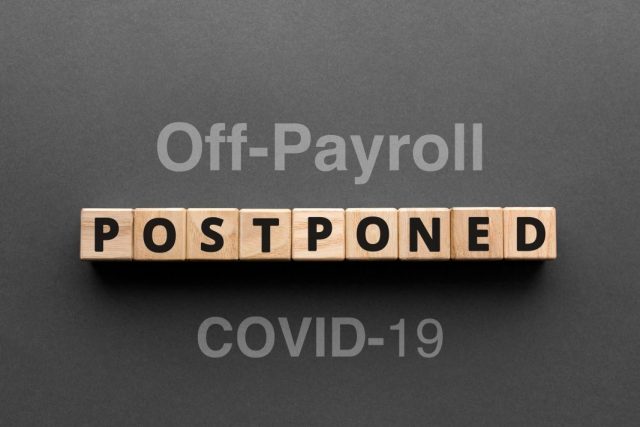The government has deferred the extension of the Off-Payroll IR35 rules into the private sector for twelve months until April 2021.
Newly appointed chief secretary to the Treasury Steve Barclay made the shock announcement in the House of Commons on Tuesday evening as part of a wider £330 billion package of measures to soften the economic blow of the deepening coronavirus crisis to business, which includes a business rate suspension, emergency loans for companies and financial assistance to airlines.
“We will do whatever it takes to give the British people the tools to get through this challenge”, he said. “The Government are postponing the reforms to the off-payroll working rules IR35 from April 2020 to 6 April 2021 … This is a deferral in response to the ongoing spread of covid-19 to help businesses and individuals. This is a deferral, not a cancellation, and the Government remain committed to reintroducing this policy to ensure that people who are working like employees, but through their own limited company, pay broadly the same tax as those employed directly.”
The rules, which make the hirers of contractors responsible for assessing their contractors’ IR35 status, had been due to take effect in just three weeks on April 6. Their looming implementation had already made several major firms impose blanket bans on limited company contractors, including HSBC, Barclays, RBS, Vodafone, GSK and BAE Systems, forcing contractors away in droves. Other firms simply said they would not continue to use any contractors post-April due to the administrative burden and financial risk inherent to the reforms.
Whether these firms will now reverse these policies for just twelve months remains to be seen.
The reaction from the contracting sector was overwhelmingly positive. James Poyser, CEO of inniAccounts and founder of the offpayroll.org.uk campaign group, welcomed the pause as it “means that contractors can now switch gears and put all of their energy into the wider challenges we’re all going to face.
“We’re going to have to keep a watching brief on the market in the coming months. Whilst the wider economy is due to enter a turbulent period, it’s clear by the scale of the £330bn financial measures made available by the Treasury today that the government wishes to keep the economic engine running as much as they can. We hope these two factors combined have an impact on the contracting market.”
CEO of the Qdos Contractor IR35 consultancy Seb Maley told ContactorUK.com: “Whatever commentators might try and claim, nobody saw this one coming, particularly given last week’s Coronavirus-dominated Budget confirmed that reform would still go ahead.
“The news will come as a huge relief for contractors, many of whom were bracing themselves for the worst.
“I should add that it seems likely that changes will be introduced next year…[although] the extra time afforded does give private sector firms more time to prepare and successfully implement the changes.”
IR35 expert Rebecca Seeley Harris suggested that, in addition to the COVID-19 pandemic, an ongoing review of the reforms in the House of Lords may have played a part in the deferral of their implementation: “Ministers have clearly already listened to the House of Lords Finance Bill sub-committee, which sent a very clear message back to them via Lindsey Whyte, one of the witnesses for HM Treasury.
“I am as shocked as I am relieved that finally contractor companies and their clients have got the delay that they need to put these measures in place. The government have made it clear that this is a deferral not a cancellation so it is important that businesses keep it in mind at the appropriate time, and now focus their efforts and whatever is needed to deal with COVID-19.”
Andy Chamberlain, director of policy at the Association of Independent Professionals and the Self-Employed (IPSE), said the British government’s decision on IR35 was “sensible.”
“These changes have already undermined the incomes of many self-employed businesses across the UK. However, they would have done even more serious damage if they had gone ahead as planned. It is right and responsible to delay the changes to IR35 for at least a year during the Coronavirus crisis, to reduce the strain and income loss for self-employed businesses,” he added.
Dave Chaplin, director of the Stop The Off-Payroll Tax campaign, and CEO of contractor website ContractorCalculator.co.uk said in light of current world events, delaying the rollout is the right thing to do.
Even so, Chaplin’s campaigning efforts will continue apace, with a renewed emphasis on ensuring a thorough review of the legislation is undertaken.
“We must now keep pushing for changes to outlaw the disgrace of ‘zero rights employment’ and to make it illegal for firms to push employer’s taxation onto contractors. We must also push for the genuine review of IR35 legislation promised by the previous Chancellor, as part of the Conservatives planned review into self-employment,” he said.
Over the next year, it’s time to finally overhaul the discredited IR35 legislation, which everyone knows doesn’t work and instead come up with a way to properly recognise contracting and freelancing in the tax system and ensure people are either classed as self-employed or are employees with full rights and benefits.
18th March 2020









